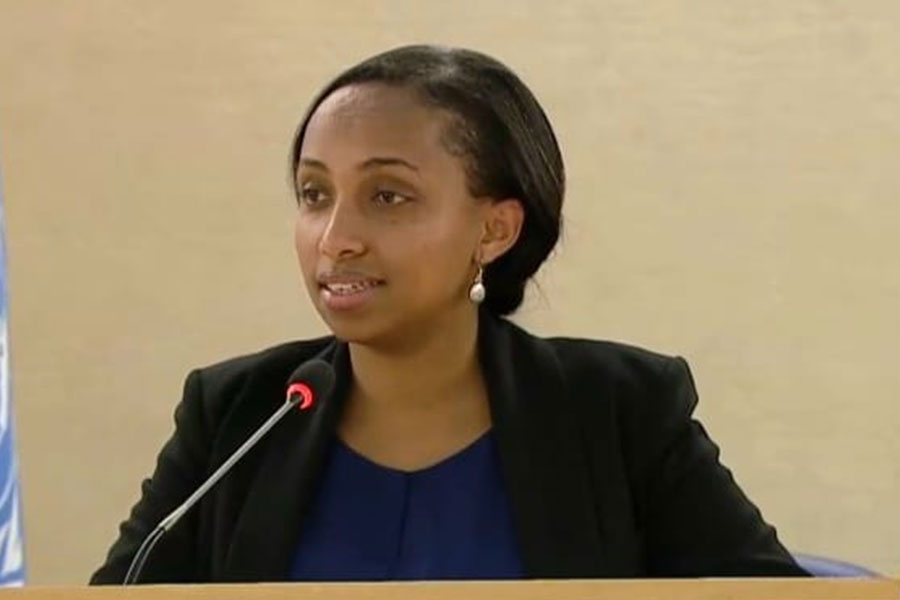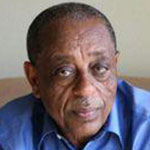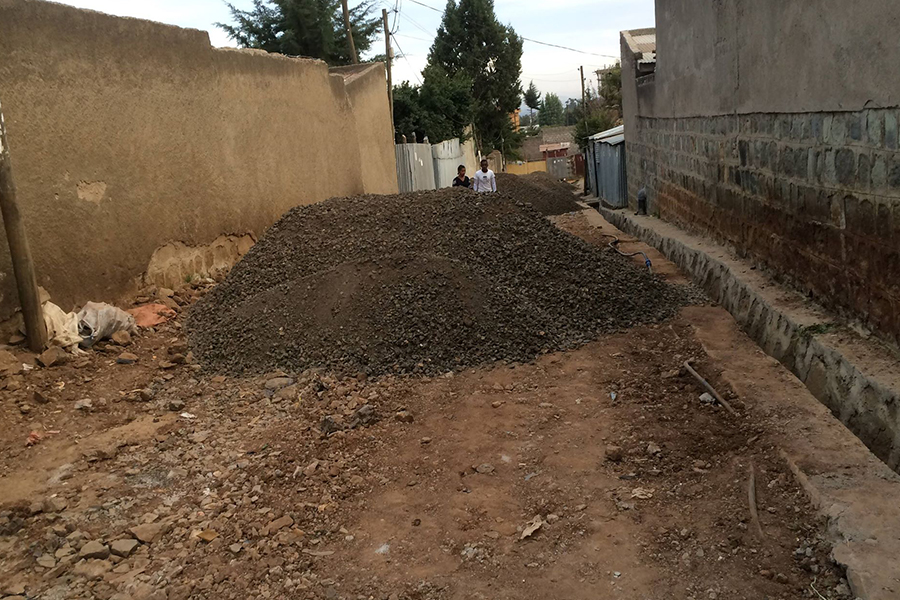
Nov 16 , 2019.
The time now compels one to recall an instructive observation Edmund Burke, the 18th century Anglo-Irish statesman and philosopher, made on love and hate.
"Those who do not hate where they ought to hate will never love where they ought to love."
Hatefulness is mortal. No less is it human in its expressions. So is the administration of Prime Minister Abiy Ahmed (PhD), which is legislating at full speed the criminalisation of what it describes as, "hate speech and the dissemination of dangerous fake news." A week ago, the Council of Ministers he chairs approved the bill and passed it on to parliament to make it the law of the land. If passed, it will be depressing and regrettable.
The bill has been languishing in the Office of the Federal Prosecutor General, under the authorship of Gedion Timothewos (PhD), a state minister. The last six months or so have passed without much of a mention before the bill surfaced at the Council of Ministers, seemingly with little public scrutiny. That is disturbing.
Gedion's drafting committee had conducted a few discussion forums back in the spring, which ironically exposed the grim reality that freedom of speech has few allies in the political establishment, including the opposition camp. However, considering the concerns and misgivings articulated by the media and the seriousness of the issue, there was widely shared expectations that there would have been further debate and public dialogue on the issue. Alas! The silence since then was misinterpreted as a sign of retreat from and a reconsideration of the bill, if not an abandonment of it. It has made its comeback rather stealthily through the backdoor. It is not a wise move.
Legislating hate speech anywhere in the world has been contested and the outcome has been elusive. That is because laws enacted to sanction dangerous speech fail to meet the basic requirements of workable laws. Often they are not clear, predictable and proportionate. Although their advocates often mean to enforce civility in public discourse, they have hardly succeeded, because instead of helping people to learn to live, ignore or deal with it with more loving speech, they tend to encourage them to take offence.
India has struggled to subdue hate speech, blaming it for inter-communal conflicts and the loss of many lives. It legislated a law criminalising the expression of what its prosecutor deemed hate speech. The outcome was regrettable to none other than Soli Sorabjee, its former Attorney General. Says Sorabjee: "Criminal laws prohibiting hate speech and expression will encourage intolerance, divisiveness and unreasonable interference with freedom of expression."
Hate speech laws are meant to protect the sensitivities of groups and not the safeguarding of individual citizens' rights to express their views however offensive the content may be. It is illiberal in its nature. It tries to impose external constraints as opposed to encouraging self-constraint. Timothy Carton Ash, the prize-winning author of "Facts Are Subversive", wondered about the wisdom of outlawing hate speech to protect groups when he mused, "If we're to put together all the characteristics on the basis of which people may feel themselves to be insulted, and all the taboos of all the cultures in the world, and then rule them all off-limits, there would be precious little left that we could talk about."
The lack of clarity and predictability is most important for Eric Heinze, a researcher on the subject who identified close to 19 varieties of justifications for hate speech laws.
The liberal stance may not be shared by a majority of the people in Ethiopia. It certainly is not shared by Abiy's administration. There could be strong arguments made by reasonable minds for limiting free speech. The real damage that can be caused by hate speech, misinformation and fake news should not be underestimated. That is all understandable. Aristotle established three guidelines to determine when a speech becomes dangerous: It has to come from a powerful speaker with a high degree of influence over the audience; the existence of a vulnerable, impressionable audience, with grievances and fear that the speaker cultivates; and, a speech act that is clearly understood as a call for violence.
It is obvious that in a time of uncertainty and so much chaos, citizens may even wish for a benevolent dictatorship, let alone the limitations of some rights. There is a lot of wishful thinking surrounding the surprisingly little conversation that is going on about the subject.
Speeches made, despite their content, with the intention of causing physical violence should meet the full force of the law and the state should show no reluctance to fulfill its constitutional obligations in protecting citizens and their properties. No ambiguity here! But as the American analyst Susan Benesch would argue, the state should prove that the speech perceived to be dangerous was made "in a social or historical context that is propitious for violence" and through "a means of dissemination that is influential in itself, for example, because it is the sole or primary source of news for the relevant audience."
However, the instruments used to combat them, as a Committee in the House of Lords in the UK recommends, is not "more repressive laws but more free speech to combat bigotry and promote tolerance."
Contrary to this convention, a statement from the Prime Minister’s Office rationalizing the bill argues that it aims at addressing the erosion of the nation’s “social cohesion, political stability and national unity.”
It would have been nice if such fundamental problems could be fixed with the simple act of passing one magic bullet legislation. But the reality is that hiding the dirt under the carpet never gets one a clean house.
The erosion of social cohesion and national unity are rather fomented in the dark when the most stringent laws limit public discussion and dialogue. These things were not created because of the relative freedom enjoyed in recent times. They only came to light and have gotten aired out now. Driving these thoughts back into the dark alleys will not make them disappear.
It is important to remember that the political forces and their leaders that may be peddling hate speech and inter-communal violence are not new political actors. They were not born in the less than two-year period since the ascendance to power of Abiy and his allies. They are old actors born and raised under the harshest laws the country has seen such as the anti-terrorism legislation. If stringent laws were the solution, they would have gone out of existence a long time ago.
Repression? It is not the solution; it is rather the wrong medicine for the problem. Further exposure and continuous debate is the cure. It is certainly not an overnight cure, but in the long term, it is the most workable treatment.
Even more importantly, the very resistance and debate that goes on in public forums could enrich and sharpen the bill. The input forwarded in these sessions could have strengthened the law by bringing new ideas overlooked in the crafting process. By being consulted and a part of the law-making process, citizens, even those whose ideas may ultimately lose out, come to take ownership of the law. And that is the best guarantee that the law will be complied with. It is unfortunate that Abiy's administration and the authors of the bill put more trust in their muscle than in the power of their argument.
As Timothy Ash may say, they win "legal bans not through the strength of their arguments but through the argument of their strength."
PUBLISHED ON
Nov 16,2019 [ VOL
20 , NO
1020]

Fortune News | Apr 28,2025

Commentaries | Apr 10,2021

Radar | Aug 22,2020

Fortune News | Dec 19,2018

Radar | Nov 05,2022

Life Matters | Jul 13,2024

Viewpoints | Feb 08,2020

Verbatim | Mar 16,2019

View From Arada | Dec 29,2018

Fortune News | Nov 07,2020

Photo Gallery | 171515 Views | May 06,2019

Photo Gallery | 161756 Views | Apr 26,2019

Photo Gallery | 151485 Views | Oct 06,2021

My Opinion | 136302 Views | Aug 14,2021

Dec 22 , 2024 . By TIZITA SHEWAFERAW
Charged with transforming colossal state-owned enterprises into modern and competitiv...

Aug 18 , 2024 . By AKSAH ITALO
Although predictable Yonas Zerihun's job in the ride-hailing service is not immune to...

Jul 28 , 2024 . By TIZITA SHEWAFERAW
Unhabitual, perhaps too many, Samuel Gebreyohannes, 38, used to occasionally enjoy a couple of beers at breakfast. However, he recently swit...

Jul 13 , 2024 . By AKSAH ITALO
Investors who rely on tractors, trucks, and field vehicles for commuting, transporting commodities, and f...

Oct 5 , 2025 . By NAHOM AYELE
In Meqelle, a name long associated with industrial grit and regional pride is undergo...

Oct 5 , 2025 . By BEZAWIT HULUAGER
The federal government is set to roll out a new "motor vehicle circulation tax" in th...

Oct 5 , 2025 . By NAHOM AYELE
The Bank of Abyssinia is wrestling with the loss of a prime plot of land once leased...

Oct 5 , 2025 . By BEZAWIT HULUAGER
The Customs Commission has introduced new tariffs on a wide range of imported goods i...